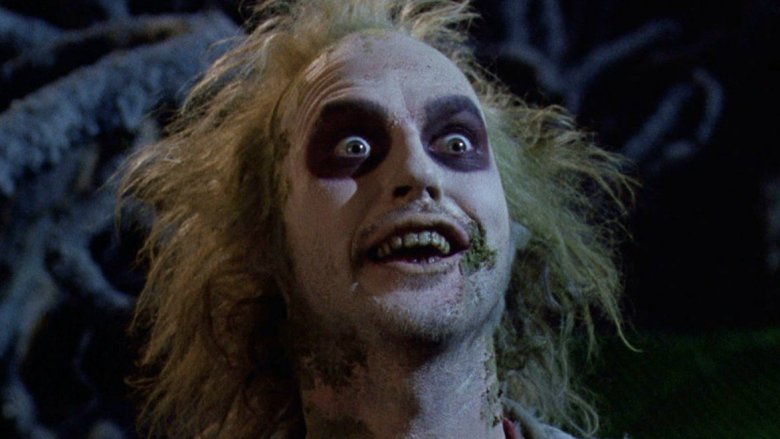The Original Beetlejuice Ending Was Supposed To Be Much Darker
Believe it or not, Beetlejuice turns 30 this week and the ghost with the most doesn't look a day over 7,000.
To celebrate the anniversary of Tim Burton's 1988 dark comedy starring Michael Keaton as a freelance "bio-exorcist" ghost who specializes in cleaning houses of any unwanted and still-living humans, writer and producer Larry Wilson opened up about the cult classic to Yahoo! Entertainment.
In case you only remember the catch-phrases, the film centers on a recently deceased young couple named Adam and Barbara Maitland (Alec Baldwin and Geena Davis) who become trapped as ghosts inside their former home. When a pair of yuppies (Jeffrey Jones and Catherine O'Hara) move in with their morbid daughter Lydia (Winona Ryder), the Maitlands enlist Beetlejuice (which is actually spelled "Betelgeuse") to help scare them out.
By the end of the movie, the Maitlands decide to instead banish Beetlejuice to a waiting room in the afterlife and try to live in harmony with the new family. It all comes to a memorable conclusion with Lydia floating in the air and lip-syncing to Harry Belafonte's "Jump in the Line."
However, Wilson said the original ending was supposed to be way less upbeat. "Our first ending was Lydia — she died in a fire and was able to join Barbara and Adam in the afterlife," he said. "A couple of people said to us, 'Do you really think that's a good idea? Is that really the message you want to be sending to the teenagers of the world? Die in a fire?' So, yeah, it probably was darker."
And that wasn't the only thing that ended up being changed. Lydia was also going to have a sister before Hollywood "script doctor" Warren Skaaren (Batman, Top Gun) took over. "Warren did a really respectful rewrite, which isn't always the case," Wilson said. "But one thing he did that I'm so delighted happened was that Lydia, the Winona Ryder character, the key character in many ways, the portal into the film for so many people, had a sister. [Lydia] was the goth, [and] the sister was the 'straight' one. Warren got rid of the sister. And what a good decision, because then it all became about Lydia."
Wilson also revealed the inspiration behind Keaton's distinctive character. "The first thing I ever remember writing about the character or saying to Michael [Keaton] about the character was, 'He's Groucho Marx from Hell.' Groucho Marx was the fastest, wittiest, most sardonic, absurdist person in the room always. But it doesn't make a difference because Michael Keaton is Beetlejuice."
The movie also had a far less interesting title. "The title that I remember being suggested pretty much before the release was 'House Ghost,'" Wilson said. "I bet it was David Geffen who said no to that — and a big, firm no. There were marketing people within Warner Bros. who thought no one would know what Beetlejuice was, but they'd know what a 'house ghost' was."
As for talk about a potential sequel, Wilson actually had a story ready in the '80s. "I had an idea for a sequel right away, and it would've just been a continuation of the story. Mr. Deetz developed a crush on Geena Davis' character," he said. "That would've been my idea. It would've been driven by character. It would've not been driven by a premise."
However, Wilson is actually happy that a sequel never came to pass. "I would love the money that would come with a sequel, but in some ways, I'm really glad there hasn't been one," he said. "That movie, in so many ways to me, is like lightning in a bottle. [It's] one of those one-of-a-kind experiences and one-of-a-kind films that the talk of a sequel always makes me creatively a little bit nervous."
